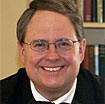Commentary on Ephesians 1:15-23
It is a sad commentary on our times that, if many Christians think at all of eschatology, they do so equipped only with the anxious, warped boilerplate of Left Behind.
This year’s epistolary lection for Christ the King offers a very different eschatological vision: more spacious, glistening, and healthier. This is scriptural mind-expansion, sans hallucinogenics.
Begin by noticing that Ephesians 1:15-23 — indeed, the letter in its entirety — is an uninterrupted thanksgiving: “I do not cease to give thanks for you as I remember you in my prayers” (verse 16). Thanks are extended, not to the letter’s recipients, but to God for stimulating the church’s faith, love, insight, and hope (verses 16-19).
In Ephesians theology is not a tool deployed for homiletical preparation or an apology for faith after the fact. Theology is doxological; doxology is theology. To lead worshippers in glorifying God’s magnificent gifts is, for this biblical author, the essence of theology and its reason for being. To those who take up this text for preaching: please check all moralism at the door. This lection is no memorandum of ought and must and should. This is a hymn for singing.
The heart of this pericope is praise of God’s majesty: “the Father of glory” (verse 17) who has bestowed on Jesus Christ a lordship befitting resurrection from death and a seat at God’s “right hand in the heavenly places, far above all rule and authority and power and dominion, and above every name that is named,” now and in the age to come (verses 20-21). Here lies the lection’s gospel edge, which prevents this hymn from curdling into sour mush.
If the church’s witness is true, if in fact God has made Christ the King, then no other power on this earth is sovereign and deserves ultimate obedience: neither the United States nor its Democrats, Republicans, nor Tea Partiers; neither K Street nor Wall Street nor Goldman Sachs; no social or economic construction by this world’s wise and well-healed, however high-minded or mean-spirited. Before Christ the King, all our idols collapse beneath his feet as rubble before the One who has subjected all things to his Messiah (verse 22).
Therein lies judgment: on this of all Sundays, the impostors to whom we have pledged our allegiance are exposed. Herein lies grace: on this Sunday we receive afresh “a spirit of wisdom and revelation as [we] come to know him” who alone is Lord of our lives (verse 17). On the Sunday of our King, Jesus Christ declares the church’s independence from every fraudulent lord to whom his children have sold their souls.
Ephesians pulls away our confusion, drawing back the curtain to reveal reality as Christians know it by faith. This letter does not deny deep human divisions (2:11-22), the fragility of peace (4:1-16), alienation and ignorance and callousness (4:17-24), “bitterness and wrath and anger and wrangling and slander, together with all malice” (4:31). We inhabit a diseased and disfigured world, as pastor and congregation know too well.
Ephesians’ faith — the faith it elicits in its preachers, for the fortification of their people — is that none of these things can or will defeat God, shackle his Christ, or enslave his church. Christ Jesus occupies the heavenly throne now. And so even now, in spite of all temptation to surrender, Christians trust their Lord Jesus (1:15a). They love one another (verse 15b). “The eyes of [their] hearts” light up (verse 18a: my translation of a brilliant image).
The hope to which Almighty God has called the church, not some self-fabricated delusion, kindles assurance of an imperishable inheritance beyond and apart from all wealth as this world reckons it (verse 18b). If Christ is King, then Christians are not helpless victims. They are conduits of Christ’s immeasurably redemptive power (verse 19): the church is the very body of his fullness that fills all things with loving goodness (verses 22b-23; also 2:8, 10, 19-22; 3:10, 17-19). If the Holy Spirit has sealed Christians for the day of redemption (4:30), then nothing — unemployment, poverty, cancer, war, terrorism — nothing can break God’s self-bonding to us through Christ the King.
Christ is King every Sunday, every day of the week. On this Sunday, however, the church has decided that it will state the matter plain to ourselves and to the world: Jesus alone is the true Lord of our lives. In such a claim there is rich hope but no shabby sentimentality.
To stake that claim is nothing less than announcing the death of all that is bogus in the way we have lived. On this day sleepers wake up and arise from the dead, so that Christ may dawn upon them (5:14), as hymned by Thomas Ken (1637–1711):
All praise to thee, in light array’d
Who light thy dwelling-place hast made:
A boundless ocean of bright beams
From thy all-glorious Godhead steams.
This Sunday all our inconsequential distinctions melt away. No longer are we Jew or Gentile, black or brown or white, laity or clergy, partisans of one special interest or another. Christ is King. Our true citizenship is in Heaven, as heirs of an indestructible salvation whose sole purpose is ceaseless praise of God’s glory. That is why the church gathers in worship this Sunday. Finally it’s the only reason we ever do.

November 20, 2011